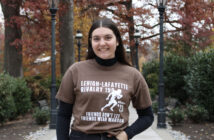Chris Mulvihill, the assistant dean of student conduct at Lehigh, is in charge of handling conduct violations that involve students on campus. A Brown and White reporter sat down with him to discuss his involvement with the university.
Q: How did you get involved with being a dean?
A: I came to Lehigh in November of 1999 and I first started in fraternity and sorority affairs. I was there for two years, and then the student conduct job opened up and I applied for it and moved into it from there.
Q: What is your typical day like?
A: A typical day usually involves between eight and 15 meetings with students. Some are just touching base with a student who maybe had some problems before so they come in and meet with me on a regular basis. Or it’s a new case where a student just got in trouble and we have to resolve that, or it’s a case where a student is reporting something to our office.
Q: What kind of cases do you have to handle?
A: The Office of Student Conduct covers any case that involves a student as the respondent. So, the allegation is that a student violated the code of conduct in some way and our code of conduct covers anything form academic dishonesty, to physical, sexual harassment, respect for property, respect for community, alcohol and drugs, etc.
Q: So when a student gets in trouble, do they come to you first?
A: Well, the process depends. If you get written up by an RA for alcohol, that’s going to come to me and then that case is going to get assigned, but that’s a pretty low-level case that most likely won’t be my responsibility to resolve. If you get cited for underage drinking by police, first you’re going to have to deal with the police. Usually for an arrest they’ll meet with me or Holly Taylor, the assistant director in my office, and we’ll resolve it.
Q: Do you think students are afraid of you? If so, why do you think that?
A: I think that there’s certainly anxiety about getting in trouble. Students, who don’t tell anybody that they got in trouble, typically tend to be a lot more nervous when they come in here because they have no idea what to expect. I think students who talk a little bit to other people find out that the process isn’t terrifying.
Q: Could you talk about the changing landscape of conduct cases and if Lehigh’s policy has changed?
A: The code has changed dramatically over the years. When I first started here, the code was much more, “you can’t do this, you can’t do that.” Now the Code of Conduct talks about expectations of conduct, as opposed to just listing the negatives. Our goal is to provide a fair process for everybody and that’s what I think we do.
Q: What would you say is the hardest part of your job?
A: The hardest part of a conduct job is that you’re constantly confronting people and they often have negative reactions to that, but you get over that fairly quickly. It’s hard in the moment, but its not long-term hard because we know that the decisions we made in those cases were the right things to do. And dealing with parents is hard because they have a hard time seeing some things that a student does in an objective way, but that’s completely understandable.
Q: On the opposite end of that, what’s the best part of your job?
A: I think my job allows me to educate students almost instantaneously because they might not always get it. But even when they don’t get it, I at least get to have a conversation about why this is important and I get to impact students as they’re moving forward through their education.





Comment policy
Comments posted to The Brown and White website are reviewed by a moderator before being approved. Incendiary speech or harassing language, including comments targeted at individuals, may be deemed unacceptable and not published. Spam and other soliciting will also be declined.
The Brown and White also reserves the right to not publish entirely anonymous comments.